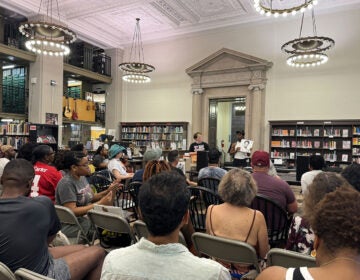After decades of borrowing rock from the West, Mongolian bands find their own voice
Listen
(From the movie Live from UB)
In 1973, the most significant cultural exchange in the world was the Philadelphia Orchestra’s first tour of Communist China.
Forty years later, it may have been Linkin Park on YouTube.
“Linkin Park changed me a lot,” said Enerelt Otgonbaatar, guitarist for Mohanik, a rock band breaking out of Mongolia.
Otgonbaatar, who bears an uncanny resemblance to a young Bob Dylan, is part of the first generation of rock musicians in Mongolia to come of age during the country’s era of democracy and capitalism, and the first to grow up with digital access to the rest of the world.
He appears in the documentary “Live From UB” screening Saturday as part of the Philadelphia Asian American Film Festival.
Rock has existed in Mongolia since 1971, when the ruling Communist government fabricated an official, state-sponsored rock band, Soyol Erdene, to quell the curiosity of youth. Kids in Mongolia at that time were secretly trading contraband copies of Rolling Stones, Janis Joplin, and Beatles records, which was illegal.
If state-sponsorship seems anathema to rock and roll, it was pretty cool at the time.
“By and large, people accepted that in order for there to be a Mongolian rock band, it had to be part of the government,” said filmmaker Lauren Knapp. “Otherwise it wasn’t going to happen.”
Knapp captured a dozen bands playing clubs in Ulaanbaatar, Mongolia’s capital city where most of the country’s 3 million people live.
“That’s pretty much the only city,” said Knapp. “They can’t really tour around the country. If they are going to have a show in Mongolia, it’s going to be in UB.”
Knapp lived in Ulaanbaatar for most of 2012 shooting the film. She followed the trials of Mohanik, a band of teenagers who put out a record of original pop-punk tunes songs in Mongolian. It did pretty well. The band then struggled to stay together, scrape up money while avoiding day jobs, and find an original sound for the sophomore effort.
Mohanik wrote songs incorporating ancient native melodies, and recorded them outside in the Mongolian countryside, where, until a few decades ago, most Mongolians lived as nomads.
“They were becoming much more serious about their music,” said Knapp. “What they wanted to do was really tap into their Mongolian culture, and find a way they could blend that with Western music.”
Knapp said many Mongolian musicians are consuming international cultural products — mostly on YouTube and iTunes — while at the same time trying to preserve their own cultural identity.
With its second album, “At Amarbayasgalant,” Mohanik has started touring outside of Mongolia, traveling to Russia and Japan. The album is available in iTunes.
“Live from UB” screens Saturday at 6 p.m. at the International House in West Philadelphia.
WHYY is your source for fact-based, in-depth journalism and information. As a nonprofit organization, we rely on financial support from readers like you. Please give today.





